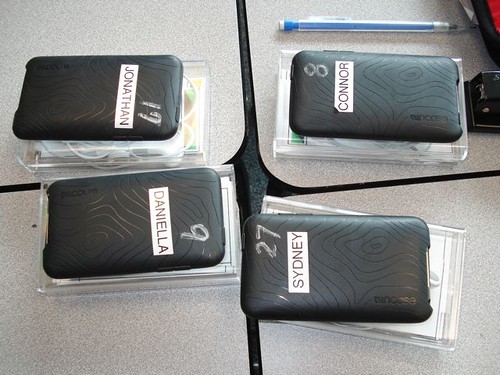While I have acknowledged the challenge that the teachers in California face in relation to their curriculum what is important for me is to attempt to consider what we have observed and the possibilities for integration in a New Zealand context (for our students), specifically in relation to our curriculum (NZC, 2007), what the evidence tells us about student learning and the potential for e-learning and effective pedagogy (p.34-36).

I would like to suggest we avoid a debate on ipod vs laptop/desktop but rather dialogue that focuses on the purpose and how does access to different technologies add value. Thinking about my own practice and what I know about New Zealand teachers, I can see huge potential for iPods because of their portability and flexibility to access the web plus recording and storing data in various formats (note to Apple - iPod needs video!)...at the same time life is too short to edit video on an iPod.
What are some of the potential benefits?
- Access and choice for students and teachers...Web, resources, tools, applications, quality digital content...when they need it.
- Greater flexibility and possibility:
- for parents to communicate with, respond and support their children and teachers
- for teachers to design learning opporunities that are relevant and effectively integrate digital content.
- Potential for teachers to stretch themselves pedagogically and explore new and different strategies for teaching and learning based on what they know about their students.
- Potential for students to develop a clearer understanding of the learning process and confidently communicate how this impacts on them as a learner.
- Professional development for teachers - meeting needs, collaborative, building capacity and sustainability. This also includes supporting teachers to be confident users of ICTs. By this I do not mean attending workshops to learn how to use the tools rather a variety of opportunities (planned, facilitated, informal and just-in-time) to learn about the technology within a context that is connected to current classroom practice. Developing the confidence to approach new technologies with an inquiring, open mind...you don't have to know how to use every Web 2.0 tool in the book.
- e-Learning and effective pedagogy - Teachers PCK, knowledge of teaching approaches that consistently have a positive impact on student learning.
- Classroom environment, access to a variety of technologies depending on purpose.
- Infrastructure*, school leadership, commitment and beliefs of all stake holders.
*Fisler has over 500+ laptops supported in their 24/7 programme, the school district supported maintenance of the network, all software and personal files were stored on a central server, there is an onsite, full time technician, students can walk in and loan a laptop if needed.
More video and feedback to come...pictures here.